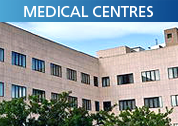
Specialized Centers
HOSPITAL CLÍNICA BENIDORM (HCB)
HOSPITAL INTERNACIONAL MEDIMAR
Coronary Bypass Surgery
A coronary bypass is a surgical operation that restores blood flow to the heart when the coronary arteries are blocked by cholesterol plaque. This is done by creating a new route or bypass around the blocked or damaged section of the coronary artery.
Benefits of the operation
Coronary bypass surgery restores blood flow to the heart muscle, and helps it to work more efficiently, thus preventing significant cardiac problems.
Medical-technical description
Coronary bypass surgery involves suturing a section of vein from the leg or chest artery or from another part of the body to the diseased coronary artery, skipping the blocked section and creating a new route for blood flow and allowing the heart muscle to receive oxygen-rich blood that will allow it to function correctly.
Patients undergo simple, double, triple or quadruple bypass operations according to the number of diseased arteries. However, the number of bypasses done is not necessarily indicative of the seriousness of the cardiovascular disease.
About the operation
There are three possible types of surgery:
- Bypass with extracorporeal circulation (heart-lung machine): An incision is made through the breastbone (median sternotomy), the heart is stopped and the blood flows through a heart-lung machine (extracorporeal circulation). This protects the heart muscle and none of the chambers of the heart open.
- Bypass without extracorporeal circulation: An incision is made through the breastbone (median sternotomy), the heart continues beating and clamping systems are used on the coronary artery during surgery. None of the heart chambers are opened.
- Minimally invasive heart bypass surgery: This may include a smaller incision and avoids the need for the heart-lung machine and for heart stoppage. It is recommended for select patients whose obstructions are easier to resolve and who have only a minor risk of complications.
All three types of coronary bypass surgery are performed under general anaesthesia and take between three to four hours. After the surgery, the patient stays in the intensive care unit for two days, and is then transferred to the ward for six to seven days. A cardiac rehabilitation plan is then started and if the patient's work does not involve physical exertion, he or she can go back after between four and six weeks.
Before the operation
- You will have blood and urine tests, a chest X-ray, an electrocardiogram, echocardiogram and coronarography.
- You must tell the surgeon if you have symptoms of fever, shivering, cough or nasal secretions.
- You must stop taking drugs such as aspirin or any other antiaggregant drugs one week before the surgery.
- It is a good idea to make a list of all the medicines you take and take it with you on the day you are admitted.
- If you smoke, you must stop smoking at least two weeks before undergoing surgery.
- When you have been admitted to hospital, you will be washed with antiseptic soap and the site of the surgery will be shaved.
- You must not eat or drink anything for 12 hours before the surgery.
Post-operative care
- You will have drains in your chest for between 24 and 48 hours.
- You will be given respiratory physiotherapy and cardiopulmonary rehabilitation.
- You must not stretch your arms out or lift any weights for four weeks.
- You must wash with antiseptic soap and dress the wounds every day.
- You will be back to leading a normal life within approximately four weeks of the surgery.



